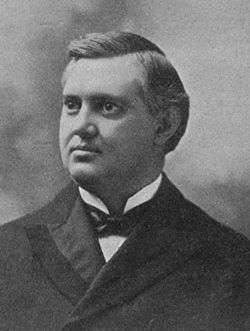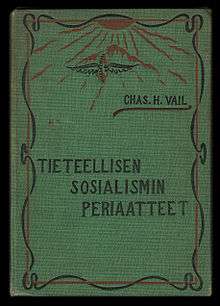Charles H. Vail

Charles Henry Vail (1866–1924) was an American Universalist clergyman and Christian socialist political activist and writer. Vail is best remembered as the first National Organizer of the Socialist Party of America and as a candidate of that party for Governor of New Jersey.
Biography
Early years
Charles H. Vail was born in Tully, New York on April 28, 1866. He attended public school in Tully and learned the trade of barrelmaker upon completion, working with his father for several years in that field.[1] Vail also showed considerable aptitude in the field of music and so he went to New York City to study under Dr. H.R. Palmer, a course which he completed in 1885.[1] Thereafter, he taught large classes in both vocal and instrumental music throughout New York City. In addition to group lessons, Vail conducted private lessons in voice, banjo, guitar, clarinet, and organ.[1] In 1887 he moved to Syracuse, New York, where he continued to teach music for the next two years.[1]
Although raised as an orthodox Protestant in the Disciple Church, Vail came to question some of its fundamental teachings and he turned to Unitarian Universalism, ironically spurred to this belief by an anti-Universalist book purchased by his parents to dissuade him from that belief system.[1]
Vail became an enthusiastic adherent of Unitarianism and came to consider the propagation of its message to be his life mission. Vail enrolled in the Theological School of St. Lawrence University at Canton, New York. He graduated in 1892 with a Bachelor of Divinity degree, but remained through 1893 to take a graduate course.[1]

In August 1888, Vail married Mary C. Ellis of Owasco, New York, but his wife fell ill and lived only a short time.[1] He was married a second time in July 1892 to Niva Bedell of Geneva, New York, a classmate from divinity school and fellow graduate of the class of 1892.[1]
Vail's first pastorate was in Albany, New York, where he spent a year at All Souls Church. He then moved to the First Universalist Church of Jersey City, New Jersey, remaining in that post for the next seven years.[1]
Political career
Although raised as a Republican, Vail's political opinions shifted fairly rapidly, turning to socialism. At the end of 1900, Vail resigned his pastorate and accepted a job as the National Organizer of the Social Democratic Party of America, forerunner of the Socialist Party of America.[1] In this capacity, Vail toured the United States speaking on various socialist topics for seven of the first nine months of 1901, traveling over 14,000 miles and visiting 19 states.[1] He was accompanied by his wife, who often shared the platform with him.[1]
On January 1, 1901, Vail was nominated by the Socialist Party of New Jersey as its candidate for Governor of New Jersey.[1] After resting for the month of September, Vail hit the campaign trail. In the immediate aftermath of the August assassination of President William McKinley by Leon Czolgosz, an anarchist, Vail faced hostile crowds and suffered cancelled meetings by those who confused the doctrines of socialism and anarchism.[1] Vail refused to bow to intimidation and delivered 29 addresses during the course of the 1901 campaign.[1] By the end of the year, Vail had toured 25 states and delivered 241 public lectures.[1]
Death and legacy
Charles H. Vail died in 1924.
Footnotes
Works
- National Ownership of Railways. New York: Humboldt Library, 1897.
- Modern Socialism. New York: Commonwealth Co., 1897.
- Principles of Scientific Socialism. New York: Commonwealth Co., 1899; Reissued by Kerr, 1908.
- The Industrial Evolution. New York: Commonwealth Co., 1899.
- Mission of the Working Class. Chicago: Charles H. Kerr & Co., 1899.
- The Trust Question: Its Political and Economic Aspects. Chicago: Charles H. Kerr & Co., 1900.
- The Socialist Movement. Chicago: Charles H. Kerr & Co., 1902.
- Socialism and the Negro Problem. New York: Comrade Publishing Co., 1902.
- The Ancient Mysteries and Modern Masonry. New York: Macoy Publishing and Masonic Supply Co., 1909.
- The World's Saviors: Analogies in their Lives Examined and Interpreted: A Study in Comparative Religions. London: Fowler, 1913.
- Militant and Triumphant Socialism. Chicago: Co-operative Printing Co., 1913.
Further reading
- Dan McKanan, "The Three Faces of Charles H. Vail." Unitarian Universalist History and Heritage Convocation, October 2010.